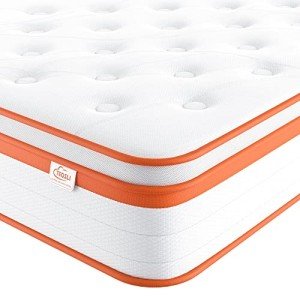The Benefits and Considerations of Memory Foam Mattresses
Memory foam mattresses have transformed the sleep market, using an unique combination of convenience and support that adjusts to the contours of the body. Known for their remarkable ability to eliminate pressure points, boost comfort, and minimize motion transfer, these mattresses have actually ended up being a popular option for lots of people. This article looks into the different elements of memory foam mattresses, including their advantages, considerations, and professional recommendations, assisting customers make notified getting decisions.
What is Memory Foam?
Memory foam, initially developed by NASA in the 1960s, is a viscoelastic material that adheres to the body shape of the sleeper. It is known for its distinct homes: high density and slow healing, allowing it to absorb weight and distribute pressure equally while going back to its original shape. This particular makes memory foam a perfect product for mattresses, offering support while lessening pain.
Benefits of Memory Foam Mattresses
Memory foam mattresses offer many advantages that add to much better sleep quality:
- Pressure Relief: Memory foam contours to the shape of the body, reducing pressure on delicate locations such as hips, shoulders, and joints.
- Spine Alignment: Proper spine positioning is vital for a great night's sleep. Memory foam mattresses offer balanced assistance, promoting a neutral spine position.
- Motion Isolation: Memory foam absorbs and separates motion, making it an exceptional choice for couples. Movement by someone usually does not disturb the other, allowing both people to take pleasure in continuous sleep.
- Hypoallergenic Properties: Many memory foam mattresses are resistant to allergens, dust termites, and mold, making them an appropriate alternative for allergy sufferers.
- Resilience: High-quality memory foam mattresses can last longer than traditional spring mattresses, keeping their shape and assistance with time.
Factors to consider When Choosing a Memory Foam Mattress
While memory foam mattresses have lots of benefits, potential purchasers should likewise be aware of specific considerations:
- Heat Retention: Memory foam can keep heat, making some sleepers feel too warm. Lots of modern mattresses include cooling innovations, such as gel-infused foam or breathable covers, to mitigate this problem.
- Preliminary Odor: New memory foam mattresses can produce a preliminary chemical odor, commonly known as off-gassing. This scent normally dissipates within a couple of days in a well-ventilated location.
- Weight: Memory foam mattresses can be heavy, making them hard to move or set up without help.
- Firmness Variation: Different brand names and models provide various firmness levels. It is vital to test a mattress's feel before buying to guarantee it fulfills personal comfort choices.
| Function | Memory Foam | Standard Spring | Hybrid |
|---|---|---|---|
| Pressure Relief | Exceptional | Fair | Good |
| Motion Isolation | Exceptional | Poor | Good |
| Heat Retention | Moderate | Low | Low |
| Back Alignment | Excellent | Fair | Great |
| Toughness | Good | Moderate | Excellent |
Kinds Of Memory Foam Mattresses
When checking out memory foam mattresses, it is very important to comprehend the various types readily available:
- Traditional Memory Foam: The initial viscoelastic foam uniquely complies with the body but may keep heat.
- Gel Memory Foam: Infused with gel particles, this foam offers a cooler sleeping surface while preserving contouring properties.
- Open-Cell Memory Foam: Designed with a structure that allows air to stream through, open-cell memory foam provides much better breathability and reduces heat retention.
- Plant-Based Memory Foam: Made with particular natural plant oils, these foams goal for a smaller sized ecological impact and can have better breathability than traditional foam.
Tips for Selecting a Memory Foam Mattress
When picking a memory foam mattress, think about the following tips:
- Test Before You Buy: Try out the mattress in-store if possible or guarantee it comes with a sleep trial.
- Consider Your Sleep Position: Side sleepers might choose a softer firmness to ease pressure on their shoulders and hips, while back and stomach sleepers might benefit from a firmer mattress to keep spine positioning.
- Examine Warranty and Return Policy: A good warranty can secure your investment, and a versatile return policy uses peace of mind.
- Research Brands: Look for respectable brand names with positive client reviews and ratings from independent sources.
Frequently Asked Questions (FAQs)
1. How long do memory foam mattresses last?Most high-quality memory foam mattresses have a lifespan of 10 to 15 years with proper care. 2. Can memory foam mattresses be
flipped?Most memory foam mattresses are designed
to be single-sided and do not require flipping. However, rotating the mattress can assist with wear. 3. Best Memory Foam Mattress ?Yes, memory foam mattresses tend
to be heavier than conventional spring mattresses due to their dense materials. 4. Can memory foam mattresses get too hot?Some people find memory foam maintains heat. Search for gel-infused or
open-cell foam choices for more breathability. 5. Are there funding alternatives for buying a memory foam mattress?Many sellers use funding strategies, allowing consumers to break the overall cost into manageable payments. Memory foam mattresses have actually emerged as a prominent choice for those seeking
comfort and support in their sleep environment. With a myriad of choices and functions available, consumers can
effectively discover the best mattress to fulfill their requirements. Comprehending the benefits, considerations, and different kinds of memory foam will equip purchasers with the knowledge to make an informed decision. As the need for quality sleep continues to rise, memory foam mattresses will undoubtedly play a significant function in enhancing sleep health and overall well-being.

